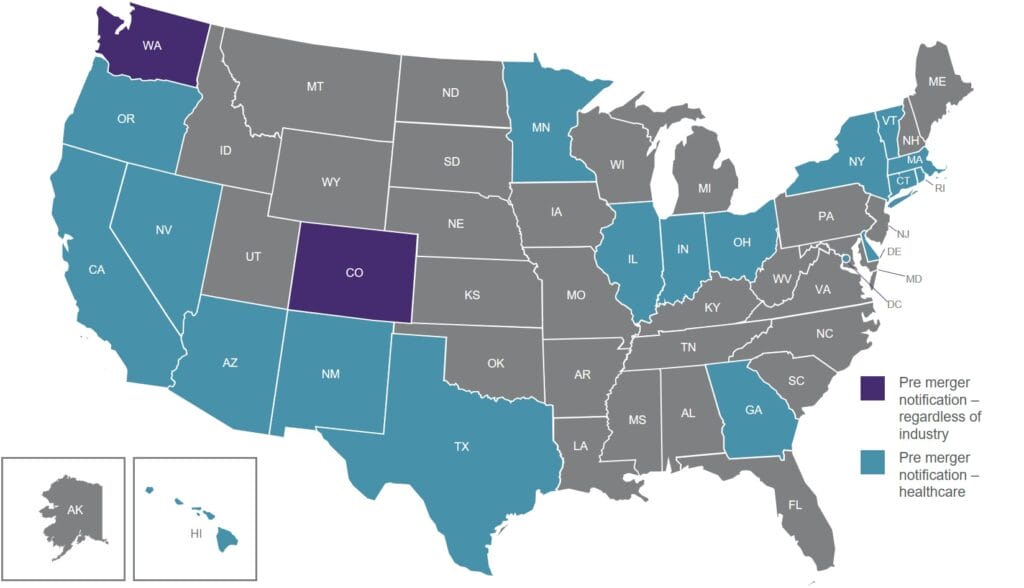State attorneys general (state AGs) are expected to ramp up antitrust enforcement. Some would argue that enforcement is an effort to fill a perceived gap left by the Trump administration, but state AGs have been signaling their enforcement prowess and exercising their independence for some time.
Nonetheless, an uptick in hiring at the state AG level since January is notable, and recently enacted laws, proposed legislation, added merger notification filings, and filed litigation mean companies should be as mindful of state enforcement as they are of federal enforcement.
1. Premerger Notification
One area where state AGs are asserting their enforcement power is in the review of transactions. These efforts take a few forms. Perhaps the most notable is a potential wave of adoption of uniform merger acts. Many state legislatures are considering or, in some cases, adopting statutes that require that merging parties file their federal Hart-Scott-Rodino (HSR) filing with the state AG as well. Known as baby HSR statutes, these laws reinforce the state AGs’ investigatory powers and ensure the state AGs receive the information necessary to determine whether a transaction reduces competition independent of the federal antitrust agencies’ decisions. Washington state recently adopted a uniform merger notification law, and Colorado’s law will take effect in August 2025. Several other jurisdictions, including Connecticut and the District of Columbia, have bills making their way through their legislatures.
The uniform merger laws are distinct from the healthcare transaction notification requirements in place in many states. Like the health care transaction notification laws, however, each state’s revenue thresholds, definitions, and filing requirements vary. The map below depicts in purple the states with uniform merger notification requirements and in blue the states with health care transaction merger notification requirements. Puerto Rico is not pictured but does have a health care transaction notification requirement. Pennsylvania and Texas have bills in their respective state legislatures contemplating healthcare transaction notification requirements. Healthcare companies considering transactions should consult antitrust lawyers for filing specifics.

2. Litigation
A second area where state AGs are likely to step up antitrust enforcement activity is litigation. State AGs have long been active in antitrust litigation, often participating in the federal antitrust agencies’ suits. State AGs have also brought independent suits on behalf of their citizens. Antitrust lawyers, however, expect an increase in state-led antitrust litigation, especially related to “pocketbook issues” such as health care and labor. By way of example, Michigan and California recently filed such antitrust lawsuits.
In Michigan v. Express Scripts et al.,the Michigan AG filed a civil complaint against Express Scripts and Prime Therapeutics, alleging the two competing pharmacy benefits managers (PBMs) entered into an agreement to fix prices, in violation of the antitrust act.
PBMs are middlemen that process prescription claims on behalf of health insurance companies. PBMs negotiate rebates and pricing concessions from pharmaceutical manufacturers and discounts from pharmacies, resulting in lower drug costs for insurance companies and patients. PBMs also process retail pharmacies’ insurance claims and reimburse retail pharmacies for filled prescriptions. The Federal Trade Commission (FTC) has investigated the PBM market and sued some PBMs for anticompetitive conduct. Michigan’s complaint cites the FTC’s PBM report.
The Michigan suit alleges that a group purchasing agreement between Prime and Express Scripts transitioned Prime’s covered lives to Express Scripts’ pharmacy network management in exchange for access to Express Scripts’ purchasing scale and power. Michigan alleges that this agreement is a naked price restraint that is per se illegal.
Highlighting its concern for Michigan residents, Michigan’s AG alleges that the PBMs’ agreement caused an exodus of independent and small pharmacies. The PBMs have not commented on the lawsuit.
In California v. Packers Sanitation Services et al., California’s AG filed a civil complaint alleging that Packers Sanitation Services’ Inc. (PSSI) customer agreements prohibited its customers, food processors, and meat-packers from hiring PSSI’s cleaning and janitorial employees, in violation of the antitrust laws.
This lawsuit is unsurprising. At a recent antitrust event, state antitrust enforcement panelists, including antitrust state enforcers from Maryland, Nevada, and Pennsylvania, identified no-poach and non-solicitation agreements as an area of increased antitrust scrutiny because labor restrictions directly impact their residents.
3. Criminal Enforcement
The final area in which to watch for increased state enforcement is criminal antitrust indictments. State AGs, including California, announced a commitment to indicting companies and individuals for bid rigging, price-fixing, and market allocation agreements. State AGs are working together to build resources to detect and indict criminal antitrust offenders. One such initiative is BRACE—a bid-rigging and criminal enforcement working group. BRACE is similar to the Department of Justice Antitrust Division’s Procurement Collusion Strike Force, which has seen significant success in prosecuting procurement-related offenses. In February, 14 state AGs attended a training, demonstrating wide commitment to the program.
While state AGs beef up their criminal skills, some state legislatures are bolstering the penalties for criminal antitrust violations. California and New York have bills in their respective state legislatures that increase criminal penalties for antitrust violations.
In reviewing their antitrust compliance programs, companies should consider the increased risk of state criminal enforcement and educate employees on the importance of state antitrust laws.
McCarter & English’s Antitrust group is monitoring the state antitrust enforcement activity and legislation. Contact Robin Crauthers for more information.
